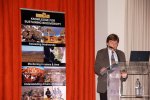|
|
|
 |
|
|
Congress newsflash
 "BIOTA AFRICA is too important to be left in the hands of the scientists alone"
This statement of Namibias Secretary of State from the Ministry of Agriculture, Water and Forestry (MAWF), Anna Shiveda, is mirrored by Hartmut Gruebel, deputy director of the German Federal ministry of Education and Research (BMBF) on the final day of the congress. BIOTA AFRICA has gained a large political visibility over the last years. This is unique for a scientific project. The creation of a large pool of data and the establishment of a solid infrastructure have been major achievements of the projects so far. The discussion of the final day of the congress showed a deep interest of the African and the German scientists to continue collaboration for the years to come. From the German political side the representative welcomed high-level inter-governmental discussions on future potential collaborations based on the governmental support.

|

|

|

|
|
Fotos: BIOTA AFRICA/Minnattallah Boutros |
 Scientists at the Spier Congress discuss cost-efficient pathways to transfer knowledge into concrete actions to restore and manage land in an integrative and participatory approach.
Building capacity and knowledge exchange systems at local community and academic level are seen as the fundament for improving self-help mechanisms in rural Africa to prevent land degradation and desertification. In order to achieve this, Africa has an urgent need for higher and also non-academic education. Most of the African countries currently don´t have the institutional capacities to address and transfer knowledge on the status of the national biodiversity to the international community (e.g. CBD COP). Lacking training and institutional structures still remain an obstacle for implementing best practices at the local, regional and national level. Partnerships between scientists, land users and policy makers are thus seen as fundamental to create synergies in action at all geographic levels and to up-grade knowledge and skills. The para-ecologist training programme is seen as one very important measure to include local communities in conservation and sustainable land use management. The training programme helps overcome knowledge barriers betweens users and knowledge generators. In order to mitigate poverty and generate alternative modes of income in an intact natural environment, it was emphasised again and again at the congress that cooperation with local communities should always be based on sound science.

|

|

|

|
|
Fotos: BIOTA AFRICA/Minnattallah Boutros |
 Day 3 of the scientific Congress highlights the conservation and use of biodiversity.
The CoCE Coffee Project in Ethiopia showed how science can help to integrate knowledge generation, capacity building and economic benefits.
The Cuvette Central Project in the Democratic Republic of Congo, situated in the second largest rainforest of the world, reveals the manifold medicinal plants which are traditionally used by the local people. The project explores the medicinal value but at the same time indicates the fragile equilibrium between exploitation and forest conservation.
Microbial Diversity - small, hidden organisms with great impact!
Soil as THE basis for biodiversity is often underestimated. Processes, feedback mechanisms and impact of soil bacterial communities on soil fertility, land-use and even climate change were presented.
Land use and climate change - One of the most prominent topics is the impact of climate change and land use on species interaction and ecosystem services and goods. Land degradation is seen as a major threat for rural livelihoods in Africa. The projects address the multifarious causes and effects of land degradation, and thus provide the starting point for mitigation and prevention measures.

|

|

|

|
|
Fotos: BIOTA AFRICA/Minnattallah Boutros |
International scientific community discusses pathways towards consolidating an African Biodiversity Observation System
The second day of the Spier Congress was dedicated to the presentation and discussions of scientific results and products which have been generated in the last seven years of the BIOTA AFRICA Project. The presentations started with the fundamental scientific work required for generating sound multi-disciplinary scientific data and knowledge for long-term monitoring. Speakers from Africa, Brazil and Germany described the development of models for assessing land cover and soils and to detect drivers of changes. Process analyses and experiments were highlighted as crucial for the understanding of ecosystem functions. A first round of ideas for continued and new research needs was exchanged.

|

|

|

|
|
Fotos: BIOTA AFRICA/Minnattallah Boutros |
 Successful start of the International Congress on Biodiversity of Africa at Spier, South Africa
Over 350 scientists from more than 15 African countries, Germany and Brazil, high-level representatives also from UNESCO, IUCN, DEAT, DST, BMBF, GEOBON, OSS, WWF and representatives of the German and several African ministries and local stake holders opened the five days international congress on Biodiversity of Africa at Spier in South Africa. The discussions on the first reflect the urgent need to continue and further strengthen the well-established partnerships between African and German research institutions and scientists. All organisations underscore the necessity of further developing a pan-African network on biodiversity which will support the national initiatives to conserve biodiversity for the sake of sustaining human well-being. It was highlighted that this African network of observation sites should be well-linked to similar initiatives at the global level. The Brazil representative welcomed partnerships with the African network.
The Congress has been organised by the German Federal Ministry of Education and Research (BMBF), the BIOTA AFRICA Project and South Africa National Biodiversity Institute (SANBI).

|

|

|

|
|
Fotos: BIOTA AFRICA/Minnattallah Boutros |
|
|
|




















